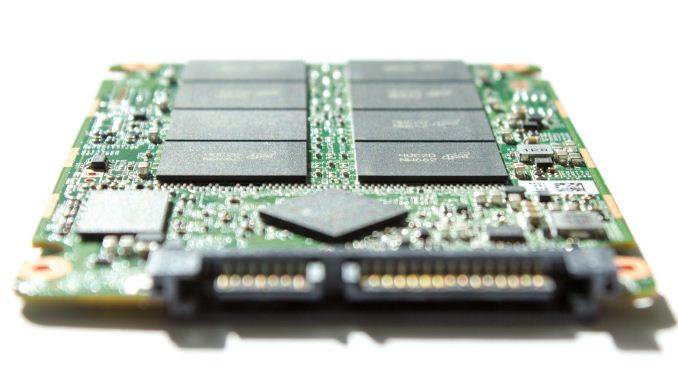Crucial BX100 (120GB, 250GB, 500GB & 1TB) SSD Review
by Kristian Vättö on April 10, 2015 1:20 PM EST- Posted in
- Storage
- SSDs
- Crucial
- Micron
- Silicon Motion
- BX100
- SM2246EN
- Micron 16nm
Final Words
The MX100 was a revolutionary product in many ways. It was the first drive to move to sub-19nm NAND, which brought cost savings along with it. The combination of price and performance made the MX100 arguably one of the most cost efficient drives on the market. The BX100 is more of an evolutionary step from the MX100 as it uses the same 16nm MLC as its foundation, but the switch from a Marvell to a Silicon Motion controller has allowed Crucial to cut the costs by another few percent, while still retaining high performance in typical client workloads.
Talking about performance, the BX100 is a great all-around performer. It performs well regardless of the workload and despite not being designed for IO intensive workloads such as The Destroyer benchmark, the higher capacities (500GB & 1TB) manage to be very close to the higher-end drives. It actually begs a question of whether it's worth it to pay the premium for a high-end drive because in reality you will only be gaining about 10-15% higher performance, whereas the cost premium is much more than that. For professionals who truly need the best IO performance, the premium can be worth it (although you should really be looking at PCIe SSDs already), but for enthusiasts it's safe to say that the BX100 delivers far more bang for the buck than a high-end SSD does (unless you're looking for a 256GB drive or smaller).
Furthermore, the BX100 is extremely power efficient and without a doubt the best drive in terms of power consumption that we have tested. For desktop users that isn't a big deal (unless you pay very close attention to your power bill), but for laptop users I would argue that power consumption is just as important as performance is (if not even more important) because increased battery life is something concrete and easily noticeable.
My only criticism is the fact that Crucial decided not to include TCG Opal and eDrive encryption in the BX100. Like I mentioned on the first page, I understand that the reason behind the move is to differentiate the BX100 and MX200, but it's still a feature that we got accustomed to in Crucial SSDs. I can't say this is a major issue because hardware encryption in the client space is still in its infancy and the software support is poor, but nevertheless it's a feature that I would have liked to see included.
| Amazon Price Comparison (4/10/2015) | ||||
| 120/128GB | 240/250/256GB | 480/500/512GB | 960GB/1TB | |
| Crucial BX100 | $68 | $99 | $185 | $375 |
| Crucial MX200 | - | $110 | $200 | $430 |
| OCZ ARC 100 | $60 | $105 | $170 | - |
| Crucial MX100 | $72 | $110 | $210 | - |
| Intel SSD 530 | $89 | $133 | $245 | - |
| Mushkin Reactor | - | - | - | $371 |
| Samsung SSD 850 EVO | $65 | $107 | $190 | $380 |
| Samsung SSD 850 Pro | $100 | $155 | $290 | $500 |
| SanDisk Ultra II | $70 | $95 | $180 | $360 |
| SanDisk Extreme Pro | - | $146 | $285 | $475 |
| Transcend SSD370 | $58 | $99 | $176 | $360 |
Given that the MX100 was already driving prices down, it comes as no surprise that the BX100 is very competitive in price. The Ultra II and SSD370 are slightly cheaper, but neither of them can provide the same combination of performance and power efficiency as the BX100 does. On that basis I would pick the BX100 over the two since the price delta is rather insignificant anyway (and obviously, pricing fluctuates on a daily and retailer basis). The 850 EVO is also very close in price and offers a little higher performance, but it can't challenge the BX100 in power efficiency, so for mobile users my recommendation would be the BX100, whereas the 850 EVO does offer marginally better value for desktop users.
In a nutshell, I have nothing but positive things to say about the BX100 for its price point, especially when it comes to the higher capacities. The performance is good for all workloads, the power efficiency is top of the class and most importantly, the overall value you get is simply outstanding. If you are on the market for an SSD right now, especially for laptop, I would highly recommend the BX100 even if your workload happens to be heavier than average.












67 Comments
View All Comments
Hulk - Friday, April 10, 2015 - link
Wow, that validates all of the other reviews I've been reading about this drive. Great performance, great value, and no TLC NAND worries. I'm getting one for my new laptop.Uplink10 - Saturday, April 11, 2015 - link
If you want a great value you better wait for a few months (maybe more than a few) till 3D NAND drives are going to come out from SanDisk, Micron, Intel, Toshiba. Then Samsing will not be the only company with 3D NAND drives and prices will probably going to come down.Harry_Wild - Saturday, April 25, 2015 - link
Thanks for the info! I will wait it out to get the best 3D NAND drives.Hace - Friday, April 10, 2015 - link
I'm kinda surprised you didn't draw more attention to the 850 EVO as a competitor, which is neck-in-neck with pricing.digiguy - Friday, April 10, 2015 - link
Yes, similar value for the money, and definitely more than the 840 EVO....Kristian Vättö - Friday, April 10, 2015 - link
I have to admit that I totally overlooked the 850 EVO as I was kinda assuming that its price would be higher. I put this review together on a very short notice as Ryan couldn't get the MacBook review finished for today, hence my mistake of not paying enough attention to the prices (even though I updated the table today...). Anyway, I've updated the conclusion to take the 850 EVO into account because as you said, the pricing is very close and it does provide a little higher performance.Hulk - Friday, April 10, 2015 - link
While the 850EVO is definitely a competitor for the BX100 the fact that it uses TLC NAND vs. MLC for the BX100 is a big deal for many people who aren't as yet convinced the 850EVO won't be affected by the read issue that is still a problem with the 840EVO. I realize the cell size for the 850 EVO's 3D NAND is much greater but as I wrote above many people, myself included, don't see the need to roll the dice on the 850EVO when the BX100 will provide basically similar performance.just4U - Friday, April 10, 2015 - link
The 850Evo is $20-$50 more on all models here in Canada. Not sure what stateside or Euro Pricing is like.Margalus - Saturday, April 11, 2015 - link
I just bought a 1TB EVO for $350 on Amazon, USArepoman27 - Saturday, April 11, 2015 - link
Kristian, hopefully you'll be helping Ryan with that MacBook review by covering the NVMe(!) SSD it ships with in depth. Looks to be a PCIe 2.0 x4 connected device dubbed "AP0256H", so possibly a semi-custom Apple controller based on the Marvell 88SS1093.